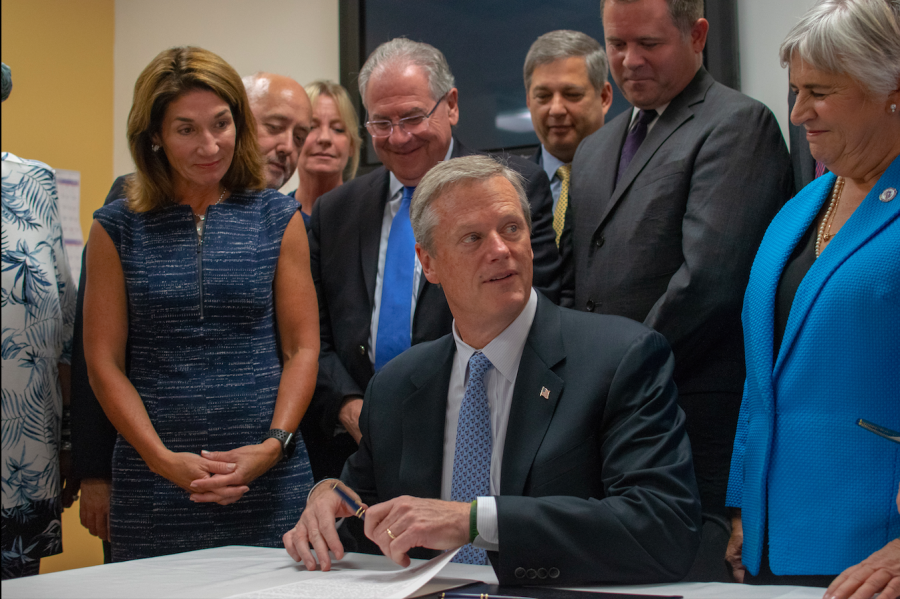Baker pushes new cannabis-impaired driving bill
Gov. Charlie Baker proposed a bill that forces providers to invest more money into primary care and behavioral health.
April 18, 2019
Massachusetts Gov. Charlie Baker introduced a bill Jan. 23 that targets people driving under the influence of marijuana. The legislation would allow police officers to ask suspected marijuana-impaired drivers to perform biological drug tests. If the suspect refuses to comply, their driver’s license would then be suspended for six months, according to the implied consent law.
The bill would also prohibit drivers from having “loose or unsealed packages of marijuana in the driver’s compartment of a vehicle,” Baker stated in a press release from the governor’s office.
Despite proposed legislation to limit the number of drivers under the influence, marijuana drug tests are still very inaccurate, said Thomas Ayres, a Northeastern law student who researched the prosecution of marijuana-impaired drivers.
“There is no THC level in someone’s blood that can indicate someone’s level of impairment. So, there’s no efficient diagnostic tool that is available to measure someone’s impairment,” Ayres said.
Drug tests could also detect remaining levels of THC in the blood even if the impairment is gone, said Richard McGowan, a Boston College associate professor in the Finance Department and author of several books focusing on topics such as marijuana and alcohol.
“Marijuana can stay in your system for over three days, so you could easily say as an excuse, ‘Well, I smoked this joint three days ago, I’m not under the influence anymore,’” McGowan said. “Legally, this is going to be incredibly difficult.”
The press release from Baker’s office outlines a change in the bill that would require the Municipal Police Training Committee, or MPTC, to include training drug-recognition experts and allowing them to testify in court.
Trained police officers would go through a 12-step process in which they would test a person’s coordination and reflexes. They would also carry out the horizontal gaze nystagmus test, during which the officer examines the subject’s eye movements to judge their sobriety.
Massachusetts legalized recreational marijuana in 2016, but the drug is still classified as a Schedule I drug on the federal level.
“We are probably a long way from finding an equivalent to the alcohol breathalyzer,” Ayres said.
Ayres also compared the different effects of alcohol and marijuana when driving under the influence.
“Studies have found that although cannabis can decrease reaction time and motor control, it does not impair your ability to drive all that much,” Ayres said. “That being said, if drivers happen to use both cannabis and alcohol … they can potentially become extremely dangerous once on the road.”
In its January assessment of marijuana use and public safety, the Cannabis Control Commission cited a 2011 study that found a correlation between legalization and a decrease in traffic fatalities by approximately 9 percent.
McGowan said the demand for a marijuana detection device equal to that of a breathalyzer for alcohol could bring groundbreaking results in addressing this issue.
“I’m sure there are many scientists trying to figure this out, given the legalization, and for the simple reason that such a discovery can make a lot of money,” McGowan said.
Michael Milburn, a professor of psychology at the University of Massachusetts Boston, said Baker’s latest bill is counterproductive. Milburn recently received a $1.7 million grant for his app, DRUID, which measures levels of marijuana-induced impairment.
“My app works using cognitive neuroscience. It doesn’t measure biologicals, it measures actual cognitive motor behaviors,” Milburn said.
Milburn said his app has the potential to become a legal and law enforcement tool.
“At this point, there is no other tool that is as good as DRUID,” Milburn said. “The DRUID is capable of differentiating impairment of different levels of THC administration.”
Governor Baker introduced this bill alongside other road security measures during the “Day of Action” for road safety.
“Today’s proposal includes important changes that will make Massachusetts safer,” Baker stated in the press release. He also invited family members of road accident victims to share their experiences at the event.







